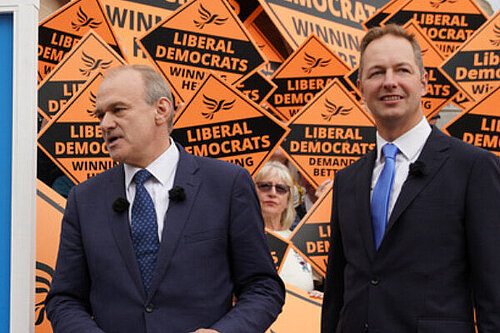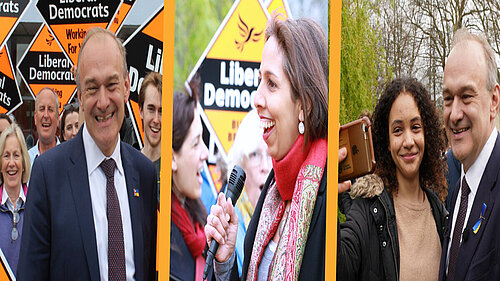
Liberal Democrats WIN Tiverton and Honiton
Richard Foord has pulled off a spectacular victory.

What an amazing outcome from this May’s local elections:
Our successes weren’t just handed to us. They happened because of a huge amount of hard work, smart campaigning and dedication over a long period of time. Thank you to everyone who made that happen - and to their families and friends for supporting them through it.
Before going into the details, thanks and sympathies for those who weren’t successful this time. Missing out on winning never feels great, but it can be even tougher when others around you are celebrating. So thank you to everyone who tried and didn’t make it this time. I hope that our successes elsewhere help give you confidence that we can bounce back in your patch too.
A particularly promising part of our successes was the breadth of them. We made gains in Scotland, in Wales and in England. We also made gains in areas where last time we elected no councillors, including from Labour. In London, for example, we won council seats on four councils where we’d won none last time around - including one of the very last councils to declare on Sunday (!), Croydon. Many of our smaller small council groups grew too.
But alongside that, in our stronger areas - and especially those where we can hope now to win at the next Westminster Parliamentary election - we also progressed. For every MP we currently have, there was more than one other constituency where we topped the poll last week.
We’ve still got a long way to go to build up our local government base to where we want it to be. But we took a big step forward last week, again, and have now made a cumulative gain of 1,207 council seats in the May elections since 2015 (compared with 628 loses for Labour and 1,095 for the Conservatives).
What was also promising was the way we’ve continued to build up a more consistent, core base of support for the party.
We both benefited this time from our vote share going up across the board, but also our progress being particularly concentrated in areas that were more heavily Remain and Conservative.
That means we got the benefits of both a growing base of support - important for our long-term health as a national party - and the benefits of concentrated support in particular areas - necessary to do well under first past the post elections.
A big part of our gains in England was winning converts directly from the Conservatives. In Conservative wards where we started in second, the Lib Dem vote went up 9% and the Conservative vote down by 10%. Tactical voting helped (Labour’s vote went down by 1%), so keep those bar charts going, but it was the direct switching that did the bulk of our winning.
One of the factors behind our success was the record volume of canvassing carried out this year, with each month scoring the highest number of voter contacts on record for that month.
I’m looking forward to our next quarterly call with the party’s top canvassers to hear their feedback, and this volume reflects the commitment all parts of the party has made in this Parliament to investing money in expanding our network of staff supporting grassroots campaigning.
Less good, however, were our candidate numbers. They rose in Scotland and Wales, but not in England. So we’ll need to make sure we learn from those areas that were successful and figure out how to make our candidate numbers in future record-breaking in the way that our canvassing was.
I joined Kevin Lang, campaign manager par excellence in Scotland, Jane Dodds, leader of the Welsh Liberal Democrats, and Cllr John Potter from Preston to talk about the lessons from these elections for the latest edition of the Lib Dem Podcast. You can take a listen in your favourite podcast app, or on Spotify here or on YouTube here.
This report has focused on the elections, but in other party news our new Diversity and Inclusion manager has now started at HQ, reflecting the priority we’re giving to this area of work in the light of the Thornhill Review.
The last Board meeting also considered the report we commissioned into the circumstances in which a key volunteer in the party’s complaints system exited their role. The report was written by Antony Hook – a barrister as well as being a Liberal Democrat councillor and former MEP. The Board accepted his findings that proper processes were not followed and that improvements need to be made to the processes used to handle such matters. The person concerned has also been apologised to.
We’ll be reviewing progress at implementing changes coming from both the Hook report and also the recent Federal Audit and Scrutiny Committee (FASC) review of the complaints system, at our next Board meeting.
As ever, if you have questions on any of this, or other party matters, do get in touch on president@libdems.org.uk.
Do also get in touch if you’d like to invite me to do a Zoom call with your local party or party body. I’m always keen to do more of these as they’re a great way of hearing from the frontline what is and isn’t working.